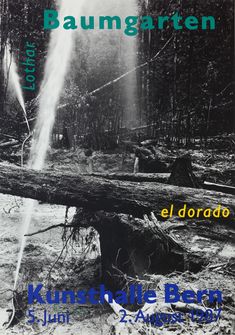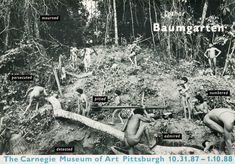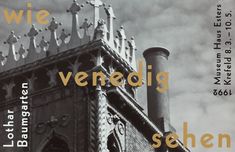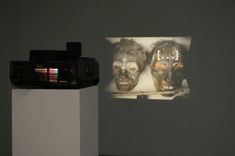Lothar Baumgarten
Lothar Baumgarten was born in Rheinsberg, Germany in 1944 and studied at the Staatliche Akademie für bildende Künste Karlsruhe in 1968, and at the Kunstakademie Düsseldorf from 1969 to 1971, including one year with Joseph Beuys. In 1978-79, he lived for a year and a half with Yanomami tribes in the Venezuelan-Brazilian border region. From 1994 to 2010 he taught at the University of the Arts in Berlin. Of his numerous solo exhibitions, those at the Guggenheim Museum, New York (1993), the MACBA in Barcelona (2008) and the Kunsthaus Bregenz (2009) stand out. He participated four times in the documenta: in 1972, 1982, 1992 and 1997, and twice in the Venice Biennale in 1978 and 1984, in which he received the Golden Lion. The artist lived and worked in New York and Berlin, where he died in 2018.
Baumgarten consistently questions the Western world’s patterns of thinking and acting, the Eurocentric view on other cultures, colonialization of the foreign, and the relationship to nature. His work rests upon anthroposophist and anthropological interests and he grapples intensely with the writings of Claude Lévi-Strauss. Like Lévi-Strauss, Baumgarten lived for a lengthy time in South America. In addition to films, photographs, and photo projections, installations, and artist’s books, he has developed site-specific installations, including ones in the form of murals. In numerous works, he problematizes the definition of culture through its opposition to nature and by showing both in joint penetration, which poses the issue of a common history. Language and writing are further central fields of investigation for Baumgarten as he attempts to make their social and political structures tangible and track down their subversive potential.
read more read lessBooks of artists
Lothar Baumgarten. Autofocus Retina. Ed. Museu d’Art Contemporani (MACBA). Texts by Cabanas, Kaira M.; Foster, Hal; Mari, Bartomeu; Rorimer, Anne et al. Barcelona, 2008.

Lothar Baumgarten. Unsettled Objects. American Invention. Ed. Guggenheim Museum. Texts by Foster, Hal; Govan, Michael; Momaday, Scott N. et al. New York, 1993.

Lothar Baumgarten. Eklipse. Ed. Portikus, Frankfurt on the Main; Museum für Moderne Kunst, Frankfurt on the Main. Texts by Hesse, Hermann; Wagner, Thomas. Düsseldorf: Richter Verlag, 1997.

Lothar Baumgarten. T'E-NE-T'E. Eine mythologische Vorführung. Ed. Galerie Konrad Fischer. Texts by Baumgarten, Lothar; Oppitz, Michael. Düsseldorf, 1974.

Lothar Baumgarten. Tierra de los Perros Mudos. Ed. Stedelijk Museum. Text by Baumgarten, Lothar. Amsterdam, 1985.
Lothar Baumgarten. AIR. Ed. Freundeskreis Museum Kurhaus und Koekkoek-Haus Kleve. Text by Baumgarten, Lothar. Düsseldorf: Richter Verlag, 2006.
Artworks

ACCÈS AUX QUAIS
Lothar Baumgarten Tableaux Parisiens, 1986

CARACAS Lothar Baumgarten
In Mir Wohnen Zu Viele Leute - Ich Brauche Den Platz Für Mich, 1986

Carbon
Lothar Baumgarten, 1991

DER URSPRUNG DER NACHT
Amazonas-Kosmos, 1973-1977

Lothar Baumgarten
el dorado, 1987

Lothar Baumgarten
mourned | presented | detested | pried | admired | numbered, 1987

Lothar Baumgarten
PORTIKUS, 1993

Lothar Baumgarten
Wie Venedig Sehen, 1992

Musée des Arts Africains et Oceaniens [Porte Dorée] Lothar Baumgarten
Dakar, Bamako, Niamey, Yaounde, Bangui, Juba, Dibouti - NO MIE, 1987

Unsettled Objects, 1968/69